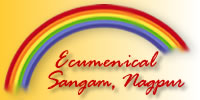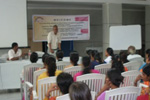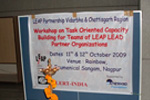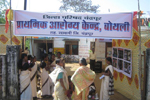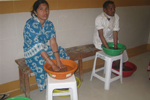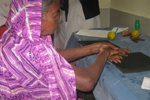Since September 2017 the Leprosy Awareness Programme has been funded by our partners in DIZ in Germany with the support of the German Ministry for Economic Cooperation and Development (BMZ) for the next three years. This programme is designed to address not only the problem of Leprosy Awareness but has been expanded to ensure that sufferers of Tuberculosis are also recognised. This programme is designed to meet the needs of those dwelling not only in Nagpur but in the surrounding villages to inform them about the symptoms but also provide information on the various treatment options.
Whilst Leprosy is a serious disease that can in the long term result in deformaties and marginalisation of the sufferers with the stigma resulting in exclusion from families and society, once it has been dignosed and recognised can be successfully treated with multi-drug therapy. Leprosy is one of the oldest infectious diseases and in India is still widespread. In some cases surgery can repair some of the damage and deformaties. But the result of neglecting Tuberculosis, a bacterial infection which most often affects the lungs with the main symptom a cough, can result in a shorter timeframe in death.
Leprosy continues to be a public health problem in many countries with 61% of the world's leprosy cases being diagnosed in India. The Sangam's Health Team and Village Health and Social Workers have been trained to recognise the disease in the rural villages and refer upwards to doctors for diagnosis and treatment. In the slums it is a different problem with Leprosy being feared and a lack of knowledge about the disease leading to the exclusion of sufferers from the community. This prevents sufferers from obtaining the services of a doctor. What they do not realize is that the disease is treatable through chemotherapy and multi-drug therapy.
Although the rate of detection has decreased, the number of cases detected every year remains high. In order to fight against the stigma associated with leprosy, and prevent the isolation of the patients the Ecumenical Sangam has co-ordinated information sessions. Mr Dilip Sathe, the former village co-ordinator has acted as the facilitator, utilising the knowledge gained in his previous work experience with Leprosy prior to joining the Sangam.
The Ecumenical Sangam in collaboration with ALERT INDIA (Mumbai) under a Leprosy Elimination Action Programme (LEAP) started a series of seminars for the young and budding doctors of Nagpur district. These seminars which are part of the Sangam's Continuing Health Education aim at promoting awareness among the young/budding doctors about leprosy treatment and thus influence the national health policy.
The Sangam has networked with renowned skin and treatment specialists together with other resource persons of the region to guide the students in the social and clinical treatment and rehabilitation aspects of Leprosy patients.
During the past year, Seminars were mainly organised for the final year students studying in different Medical colleges and this has been extended to include the Paramedical students in these sessions.
|
Since October 2013 the Sangam has continued the Continuing Medical Education programme and commenced a Comprehensive Leprosy Awareness Programme in one of the remaining unreached areas of Nagpur. This work has been made possible by a grant from Stiftung Hilfswerk Deutscher Zahnärzte fur Lepra- und Notgebiete (C.H. Bartels Fund) (HDZ) of Germany.
In the first twelve months up to the end of September 2014, 24 Continuing Medical Education programmes have been run with 1078 participants from different streams of health sciences including allopathic, ayurvedic and homeopathic medicines, pharmacy Diploma and Degree students from laboratory sciences, microbiology, bio medics, physiotherapy, occupational therapy and nursing along with their teaching staff. On the 4th February 2015 the Ecumenical Sangam held the 150th Leprosy Continuing Medical Education programme in the Rainbow Conference Hall with a total of 6338 participants since the start of this programme.
The Ecumenical Sangam are very grateful to the German Dentist's Sponsorship for Leprosy and Distressed Areas (C.H. Bartels Fund), Gottingen, Germany, for their generous support which has helped us to reach out to needy leprosy patients from the Urban Slums and also to help sustain the Continuing Medical Education programme for medical and paramedical students also among working professionals in the health field.
This support has given us immense strength and encouragement to motivate not only the young minds but also the community at large to understand Leprosy with a scientific frame of mind. It has encouraged many people to come forward for an early examination of their disease without hiding it.
|
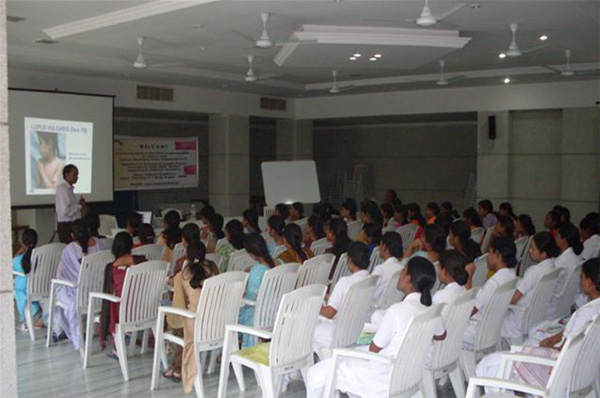
Students from nursing as well as other courses have also been included in the seminars. We have already conducted two seminars in which fifty budding nurses participated and gained scientific knowledge and understanding about the problems associated with Leprosy in detail from the experts and knowledgeable doctors.
Sessions have been recently organised for Laboratory Technicians working in some of the hospitals, clinics and in private practice in Nagpur and the surrounding districts of Vidharbha region including Chandrapur, Gadchiroli and Yawatmal. The 60 Laboratory Technicians were given practical demonstrations on skin smear tests and slides of the Leprosy bacteria were shown to them under a microscope.
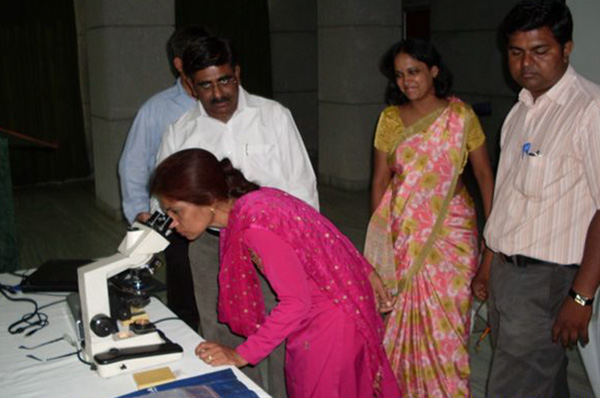
On the 16th February 2013 the 100th Continuing Education Programme was organised at the Rainbow Conference Centre for students on a Nursing Course. 45 students participated in this programme along with a number of their teaching staff. To date more than 5000 students and their teaching staff have benefited from these 117 Leprosy Awareness Seminars that have been organised by the Ecumenical Sangam's Leap team.
During the year 2008-09 the Ecumenical Sangam was given the additional responsibility to function as the lead Non Government Organisation (NGO) partner for LEAP in Nagpur to plan, monitor and execute a selective special drive to create awareness about Leprosy in the slums of Nagpur city.
Leprosy activities are covered through three different fields of action: the Continuing Medical Education (CME), the Selective Special Drive (SSD) and the Leprosy Referral Centre. Mr Dilip Sathe is organizing the Continuing Medical Education programme, the Sangam's Leap Team are training volunteer Project Health Assistants to inform the slum dwellers in the Special Selective Drive and the Leprosy Referral Centre ministers to the patients referred for treatment.
In addition to looking after the Nagpur District, from October 2009 the Sangam has functioned as the LEAD Non-Government Organisation to induct and monitor the activities of other service partners in the nearby Wardha and Amravati districts. All the blocks of house to house visits that have been undertaken in Nagpur and Amravati districts fall into the tribal or forest areas. Two blocks, namely Chikhaldara and Dharni in Amravati district, are known for acute malnutrition as well as many health related problems and most of the villages are very poor and lack basic hygiene facilities.
A total of 12 other local NGOs have become involved in the Leprosy Awareness programme organised by the Sangam to cover approx 1000 villages with a population of 950,000 in seven blocks of these three Districts. The training of 47 staff workers was completed by the 3rd week of December and they started covering the entire area with the help of local community volunteers from each of the villages. The Sangam’s team of six staff took on the responsibility of monitoring and facilitating the work of their partner NGOs. The Sangam’s team have also started working in the Primary Health Centres to strengthening the Leprosy Referral Centres in Chandrapur and other districts of Vidharbha region.
During 2010-2011, the Sangam Leap team successfully conducted Leprosy Awareness activities in Wardha, Amravati and Nagpur districts of Vidharbha. With the help of its local Non-Government Organisation partners more than 200 new cases were positively identified with Leprosy and were started on Multi-Drug Therapy treatment through the local Primary Health Centres. As part of ongoing Awareness activities an 'Exhibition on Wheels' was arranged to tour 30 locations between the 8th and 11th July 2011 to engage and inform the people met at each location. (See News page item 'Exhibition on Wheels')
Two areas, namely Dhamangaon and Morshi in Amravati district and Kamptee in Nagpur districts were chosen for Leprosy intervention during 2011-2012. The Data Collection plus Non Government Organisation selection and Training of their Trainers was completed by the end of October 2011 and 'House to House' visits commenced in the first week of November 2011.
To date more than 175,000 of the urban slum population of Nagpur city have been given the basic information about Leprosy through 'House to House' visits under the Sangam's Selective Special Drive programme. Following this programme there is a raised community awareness and people are vigilant for the first symptoms of leprosy. The message that leprosy is curable and that the treatment is relatively simple is reaching a large number of families both in the rural villages and urban slums.
During 2012-2013 the Sangam Team were supported by the Government Leprosy Department of Maharashtra in organising Leprosy Outreach Camps in 7 districts of Vidharbha to raise awareness and bring the deformed and needy Leprosy affected individuals to the referral services. In total 27 Camps were organised which treated more than 3000 Leprosy affected individuals who were assessed for their deformities and supplied with special sandals and splints. Patients were provided with treatments like HOPE (Hydro, Oil, Physiotherapy and Exercise), Muscle stimulation, dressings and other treatment in connection with reaction neuritis and other complications. (See News page item of 20/04/2013 on 'Leprosy Outreach Camps')
|
